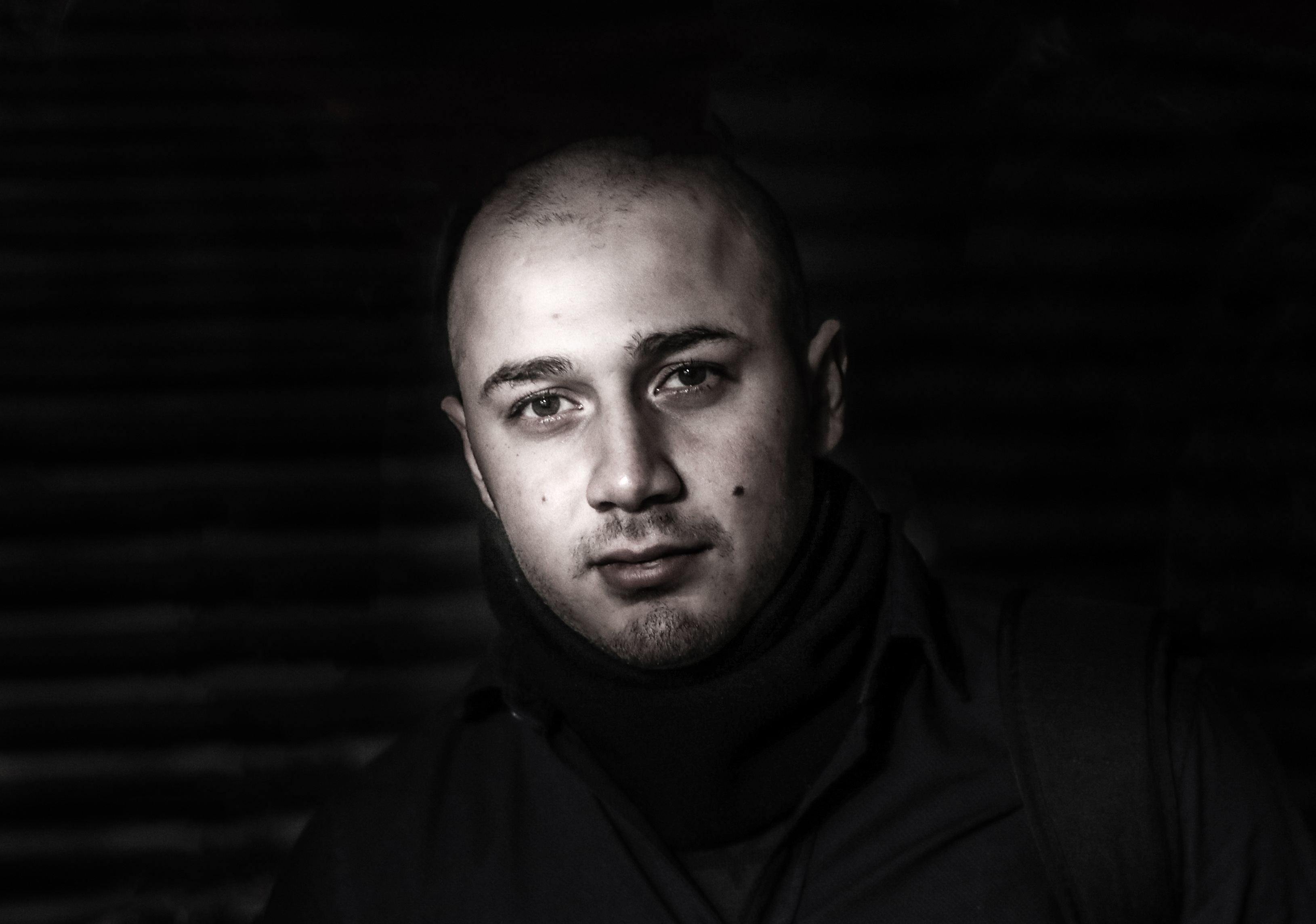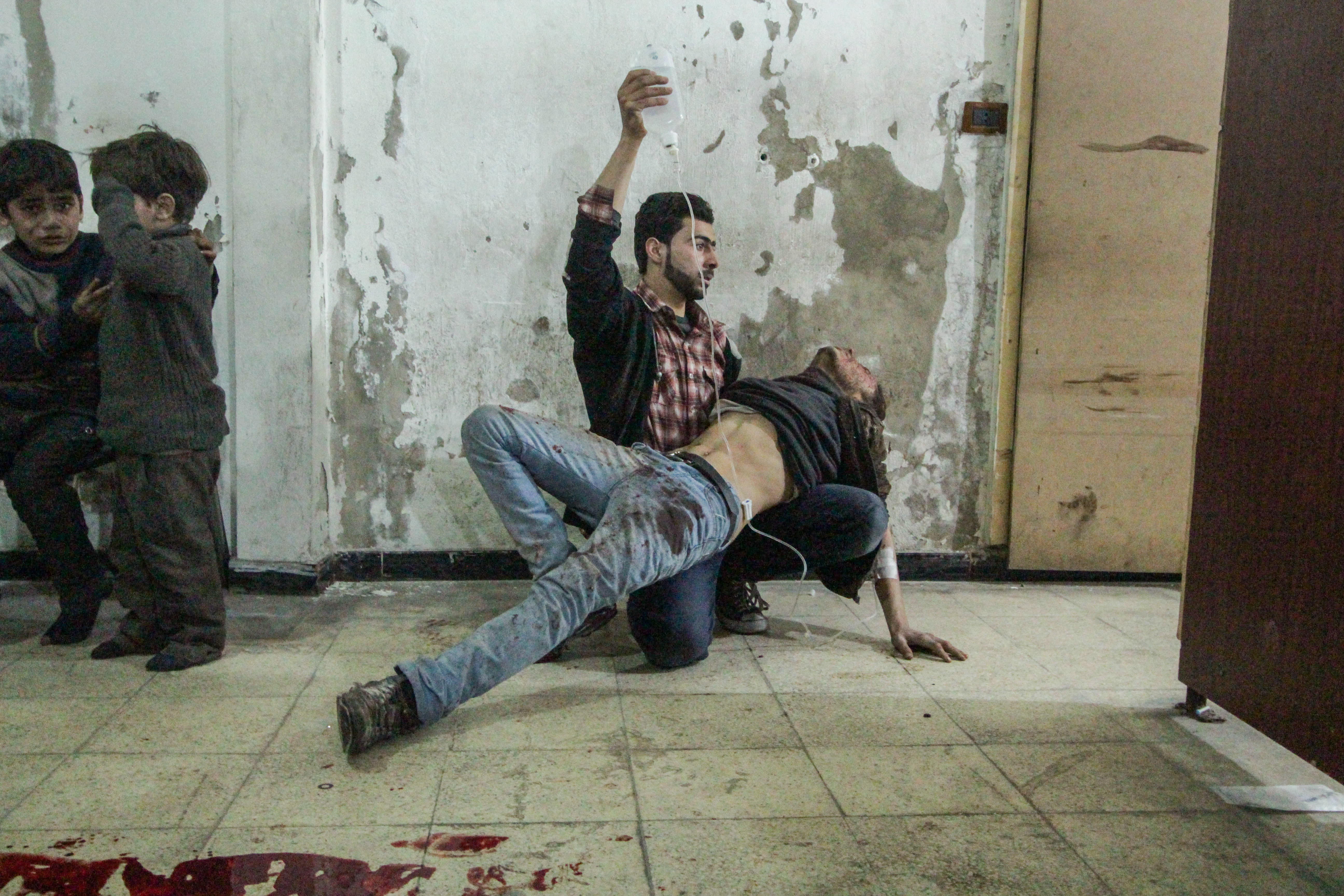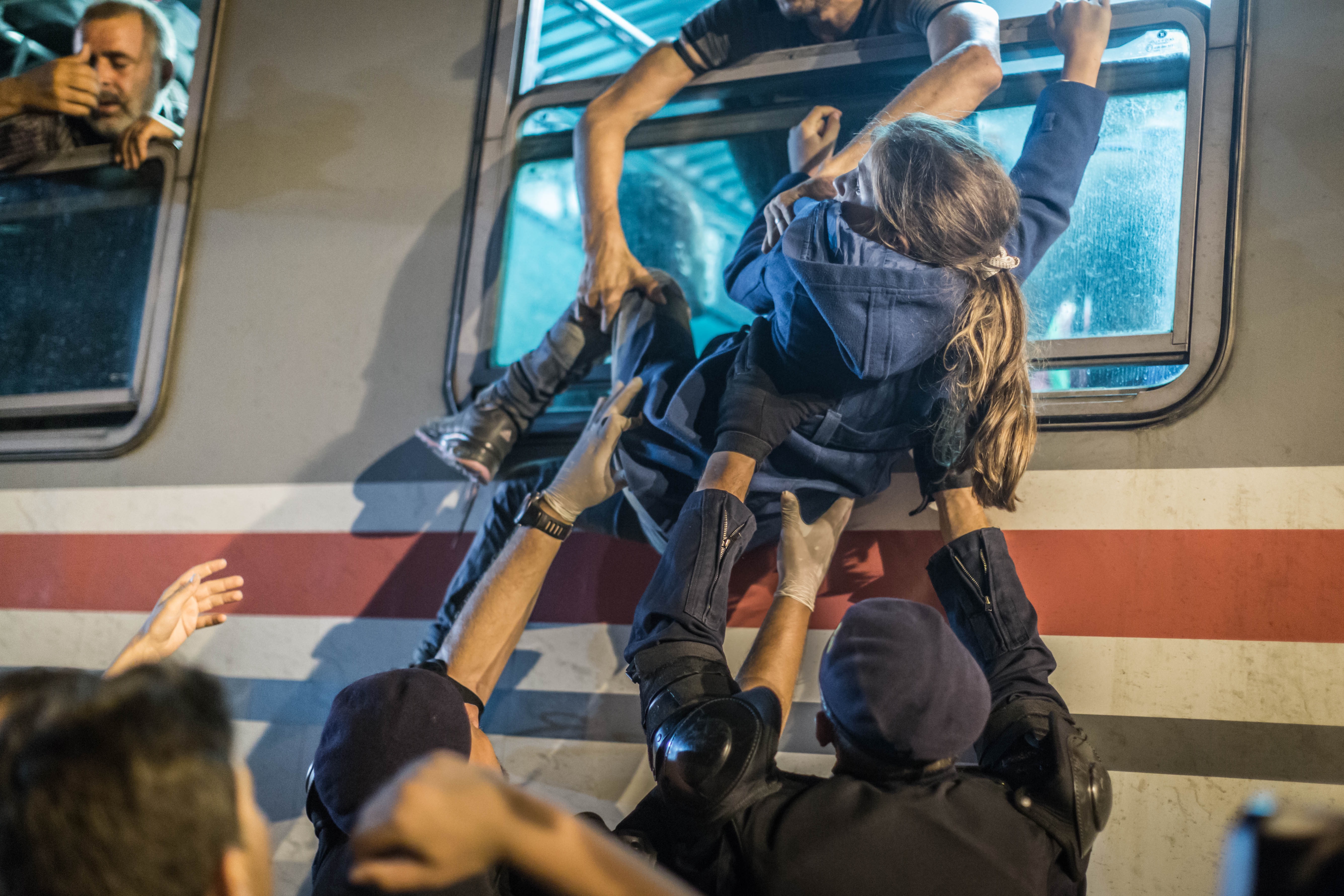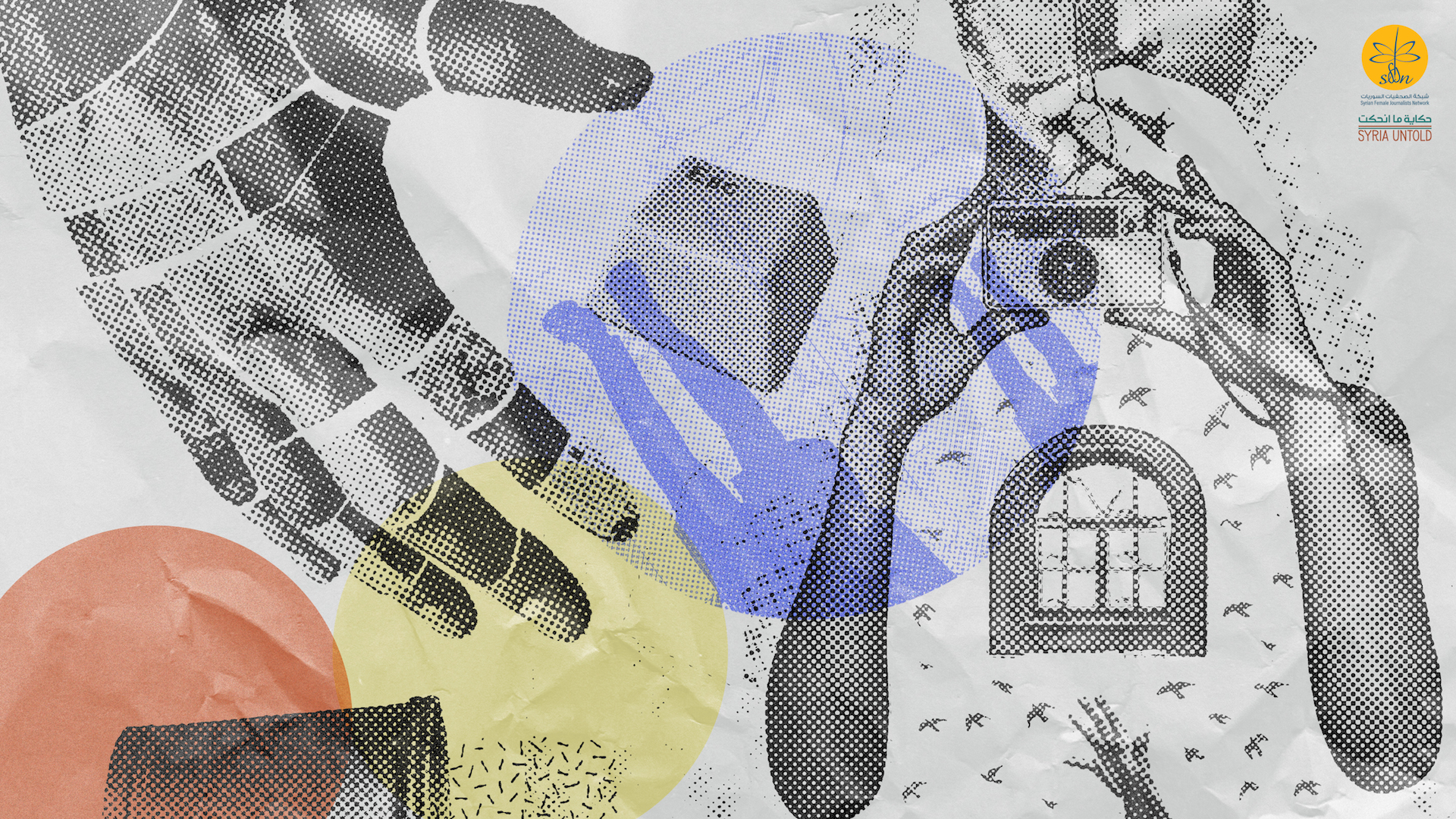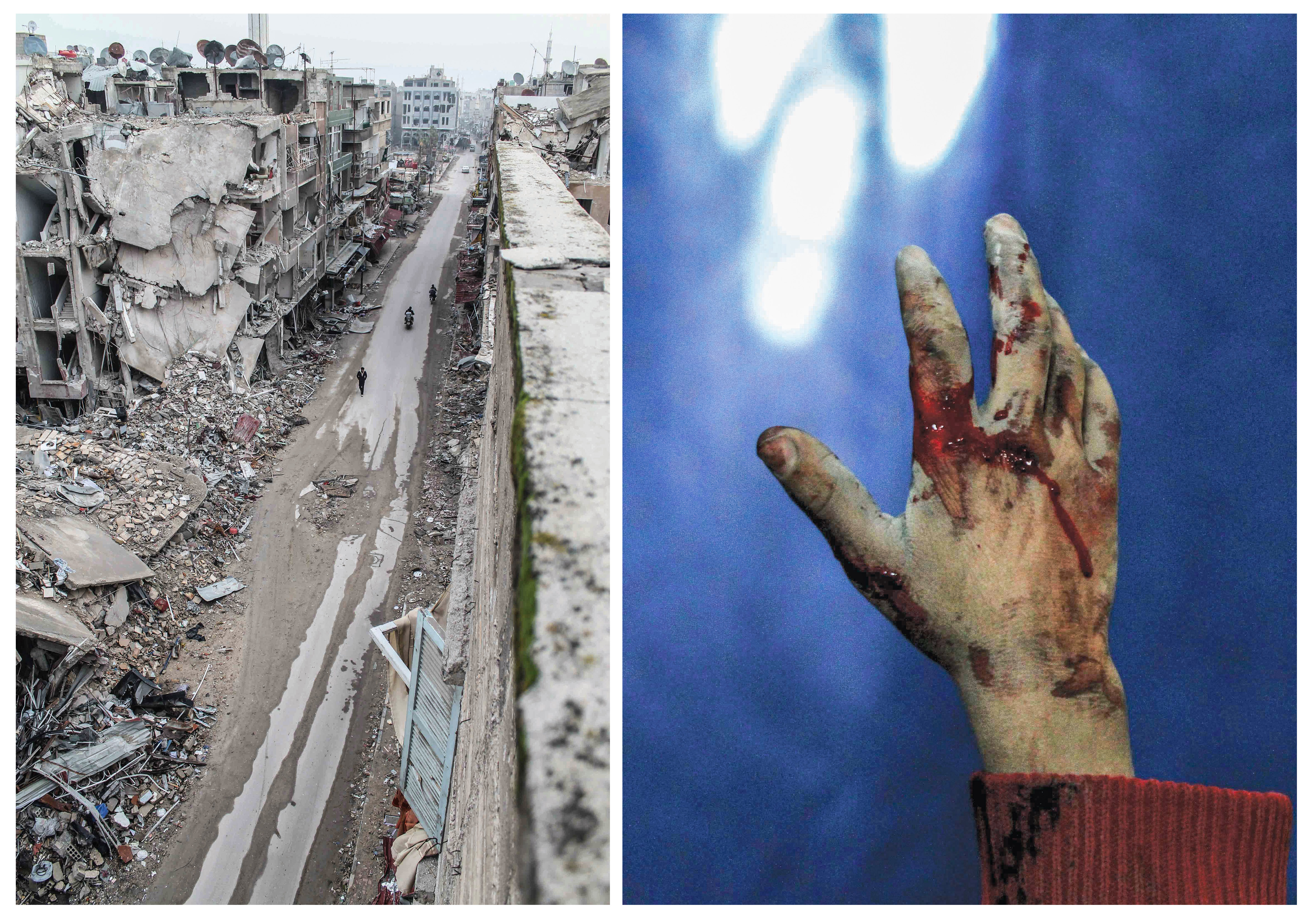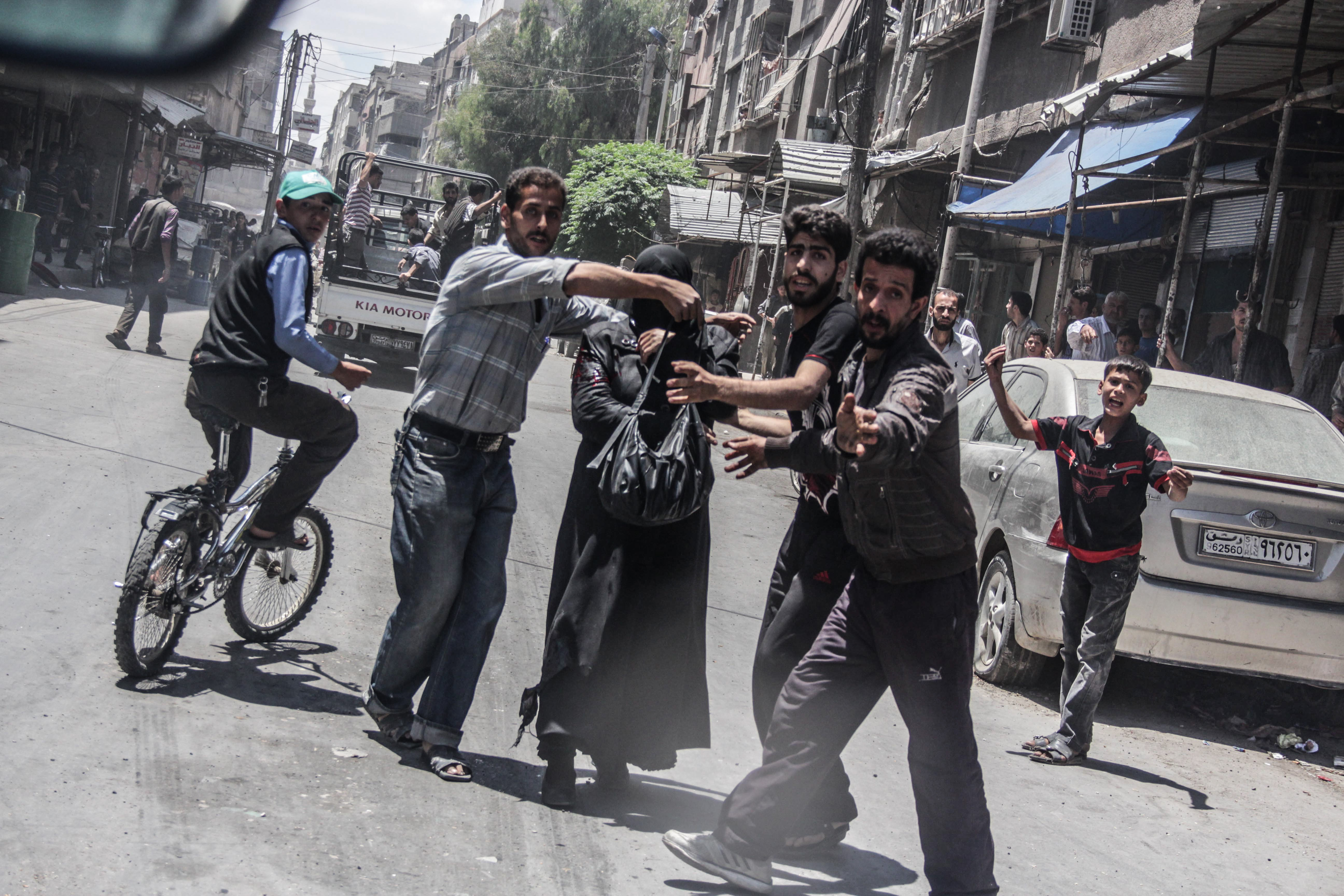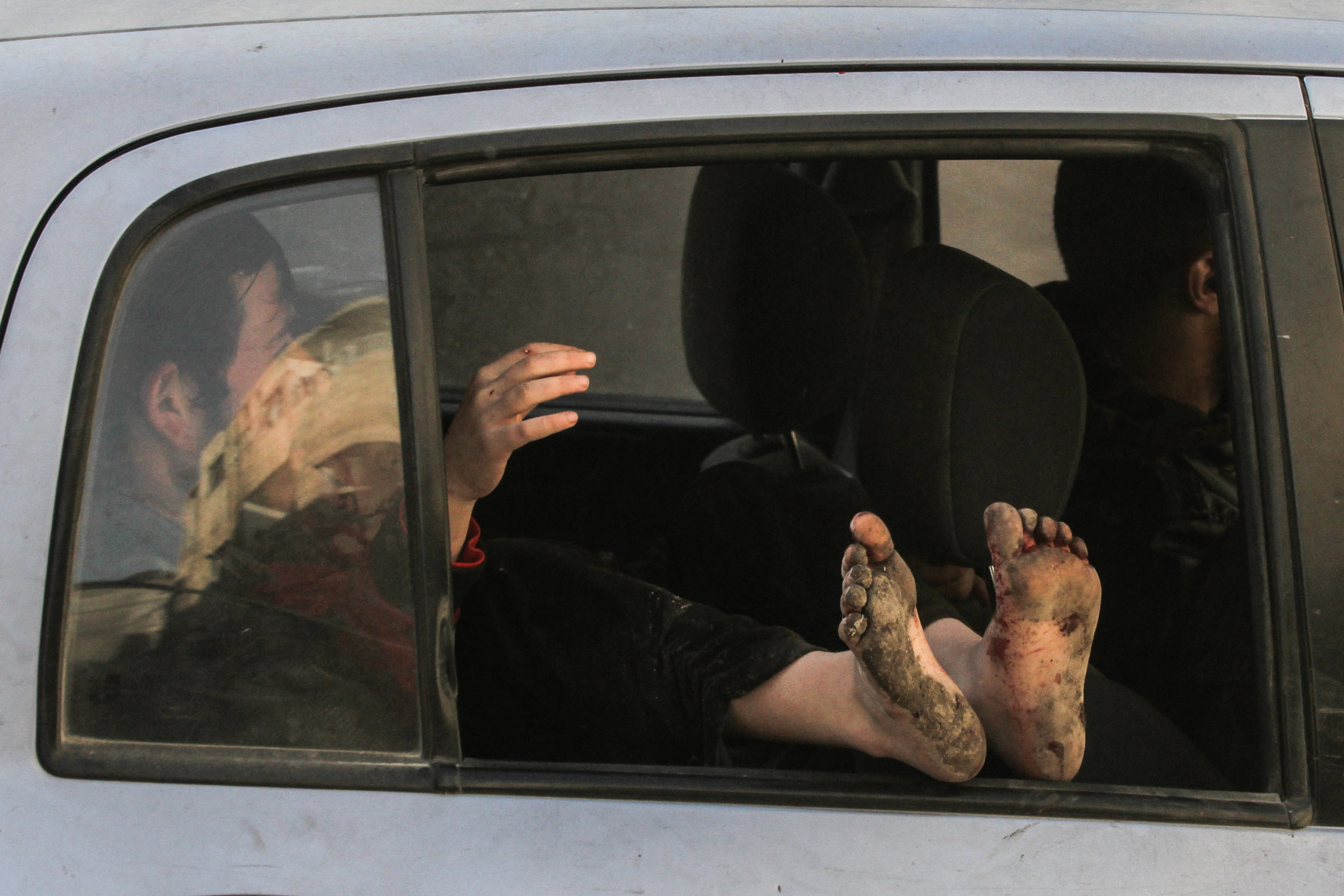This article is part of SyriaInFocus, a series on Syrian photography funded by the Friedrich Naumann Foundation for Freedom, with guest editor Sima Diab.
A bag of fear
A family fills a hospital, the floor the only gurney left to use. So many injured they become impossible to count. This is Douma on the second of February in 2015. It’s a Monday. But the injured aren’t concerned with those details.
A numbness overcomes the senses. A thousand questions swirl in my heart searching for orphaned answers until the only answer is to take pictures, an escape from thought.
I watch the injured, and see in their faces my future possibilities, as if they are a mirror of what was to come. One simple question follows another about what comes next, while the blood has yet to dry.
My eye holds no strength, so how do I have the strength to carry my camera? Light becomes heavy when it bleeds. Heavier still is the luxury of sight, the luxury becoming a curse on those who see.
His hand holds the bag of blood, and his lap holds the injured man. His eyes travel between the two. His other hand supports the injured man while he squeezes the blood in his fist. I can feel the blood flowing in that cramped space between my eyes and that bag, the injured man a bridge between us. The paramedic constricts my eyes when he squeezes and then embraces the injured man.
I try to force my eyes to escape, to the right, near the open door of the room, then my eyes climb to the man holding this bag of blood in his hand, and then back down to the injured man in his arms, then back to two children and then I drown towards the left where it crowds with the wounded, only to escape to the right again. There is no way out from the scene.
Pain has been written on my eyes many times. During each event itself, then in selecting and sorting and publishing. I relive things time and again. That is how pain is born anew. It doesn’t disappear with whatever else comes along, and time does not heal it. Our days are filled over and again with grief renewed. And all this does not equal a drop of blood from someone injured, and once someone sees an injured person it’s as if he’s seen all those who have ever been wounded.
Fear, for me, flows in my veins the way blood flowed through that injured man. I feel fear dance on my bones, playing music over my hands and my lower jaw, around my left foot and inside my heart, in between my lips and on my shoulders and back, through my eyes and what remains of my sight. I am only shivering.
I finally hold my camera, and try to bring those two children into frame, but I cannot. Half of another child is still outside my reach, a pool of blood in front of me still missing. I push my camera over to the right, but fear brings it back again to that man’s fist. All our frames are narrow. I cannot betray the event by only photographing the narrow parts of it, but what frame can fit all the light and things happening inside it? Finally, I push the shutter a few times. I thought I photographed the man, but I realized I only photographed my fear, nothing but fear.
A cup of water
Not every image falls within the structure of a frame. Some images fall beyond the borders, to connect to the heart before the eye. The hand of a child fills my eye, so then I see that hand everywhere I go. I try to capture the light with my own hand, to capture the image, both hands searching for their light. The child’s hand becomes light and my own hand is injured.
We become what we search for. And I am still at the wooden window frames that are broken, remembering my friend and how I miss our conversations and our squabbles. We snuck out and jumped the destroyed walls, our eyes taking turns through the viewfinder of the camera, our laughter, the smoke from our cigarettes, even the cold and the shivering we felt with those stones from that road, that long long road.
I was a paramedic when a friend was shot in the foot by a sniper, so I asked to use his camera the next day when we went to the market.
The body speaks. The hand of a child is injured, and through it he screams, and speaks and asks for help, he tries to grab the light and find his mother. He raises it for help and lowers it in hopelessness. He spreads his palm in shame and makes a fist in anger. His hand turns into his tongue, his fortress, his identity, his language, his country, a permanent tattoo, his memory and remembrance, the only thing left of how he can remind himself of himself so he doesn’t forget and become forgotten.
How does shrapnel not fall from the bottom of the frame every time my gaze lingers at every piece of that street? How does blood not flow down the image every time I stare at every wound on that palm? I hold the picture gently, stone by stone and wound by wound. The bombings become new bombings every time I see the pictures again. And the child’s injuries crowd my eyes until I can’t see anything else. The stones and the wounds become pixels that make up the image.
Not every image falls within the structure of a frame. Some images fall beyond the borders, to connect to the heart before the eye.
I used to hear the narrowing of his mouth from the palm of his hand. Every night I watch the walls of my house crack open. I look up at the ceiling saying: How many dead has it seen and will see with its final light? How many dead will have their hands scream out, the last message they’ll leave behind? I miss my friends. They were killed later, one by a sniper and the other under torture.
I pick myself up. I get a cup of water, I remember the injuries of the child, a fist and a hand. I ask myself: What if my mouth was injured so badly I could no longer speak or laugh or scream in pain? Can I yell enough? How would I even ask for a cup of water?
Tobacco and blood
After a long day, my friend, a doctor, sits in the corner of a room contemplating a cigarette. It has turned to ash on the side of the ashtray. He picks it up and takes a long deep drag. The gray smoke swirls and makes him forget the red blood between the walls of his throat and lungs.
My friend was screaming silently, without letters or words, without prepositions or metaphors or poetic phrase.
In the crowd, words like “X-ray”, “chest”, “zero”, “on the 99”, “high of 200” fall like rocket shells on everyone’s ears. “Ventilator” “catheter” “blood bag” “bandage” “martyr.”
My friend screams: “O-NEGATIVE!” And the words jump like hot coals from one person to another until they return to him once more. He yells it again until the echo slaps it back. It isn’t available. And then someone screams for his child, and another about an empty bed, and a man silently watches the sky, waiting for God and the arrival of an ambulance.
I am with my friends in the car everyone has been waiting for. We carry a woman from the place of the shelling. She wears black like the darkest of night and carries a bag in one hand and her disappointment in another. People swarm around her, speaking to us with their hands. Her sleeves are black and she is shining, her robe torn around her, not from poverty or from age. It was the treacherous rocket that ripped her long robe, and her arm, and the blood. The sun makes her shimmer.
Before that ride, during the first hours of our shift, before we heard the sound of that shell falling, my friend the doctor pokes around in the burnt-out ashes of his cigarette for any leftover tobacco he can smoke. In the break room we listen to calm music in one ear and with the other we hear the treacherous fear outside.
My friend, the doctor, lights his cigarette, and then the intermittent sound comes slowly rising. We leave our cigarettes burning on the side of the ashtray to begin.
A window and a foot
I run towards the sound, one foot racing ahead while the other drags me down. It is heavier than I can carry, shaking and slowing me so I am not too hard on them...but I keep running.
I feel fear dance on my bones, playing music over my hands and my lower jaw, around my left foot and inside my heart, in between my lips and on my shoulders and back, through my eyes and what remains of my sight.
I leave my house and enter the one immediately next to it, and zigzag in between the entrances until the end of the road. I reach the other sidewalk running. This is the way to cross the road with fear.
I was asleep with complete exhaustion when I heard a small explosion. A few minutes passed that felt more like years and then many large explosions followed one after the other until the curtains of my window blew open inside the room.
I tried to gather myself in between the edge of a dream and the valley of reality. I waited for the end of the nightmare and thought my neighbor’s screams were fake, just like I thought the loud sounds after the explosion were fake. But survival instinct makes you believe.
The first sound was the lobbing of rockets, but the large repetitive booms were the rockets meeting their targets and exploding. And that moment of waiting, that was the bridge between the ignition and the explosion, the distance from a warplane to the civilians below.
I reach the sidewalk and run through each entrance one by one until I get to where the rocket attack happened. I find a small car. In its window are two small legs that look 90 years old but belong to a girl no older than 10. The color red is painted on the heels of her bare feet, painting the borders of the entire country and all that is in it.
Her hand rests on the window and the other is hidden behind her. What is it that spares me from being in her place, my legs hanging outside the window like hers? The missile missed me and hit her instead, but reached my heart. It has yet to find a window to hang over.
Yesterday’s window doesn’t look like today’s. I remembered the feet of the girl and the window as I looked at the world from the window of the ambulance. The windows are different but the wound is the same, the universe outside Ghouta seemed so wide, but they were narrow for us, so narrow they could not fit the feet of a child inside the ambulance.
A slide and an alarm clock
God’s arm was stretched out to touch Adam, who needed it. He sat without much effort, God stretched it out and Michelangelo took it and painted it. God’s arm extended to us and we waited for our Adam to take it.
I wake up every day without the ring of the alarm clock. All the hours seem the same. No beginning and no end, and our years end every evening, a painful stretch of time.
The day before a huge snow storm, I saw some boys taking turns playing on a worn-out slide. Once each boy reached the top, he'd extend his hand down to help the next boy up. My heart clung to their palms each time one of them reached out to help another.
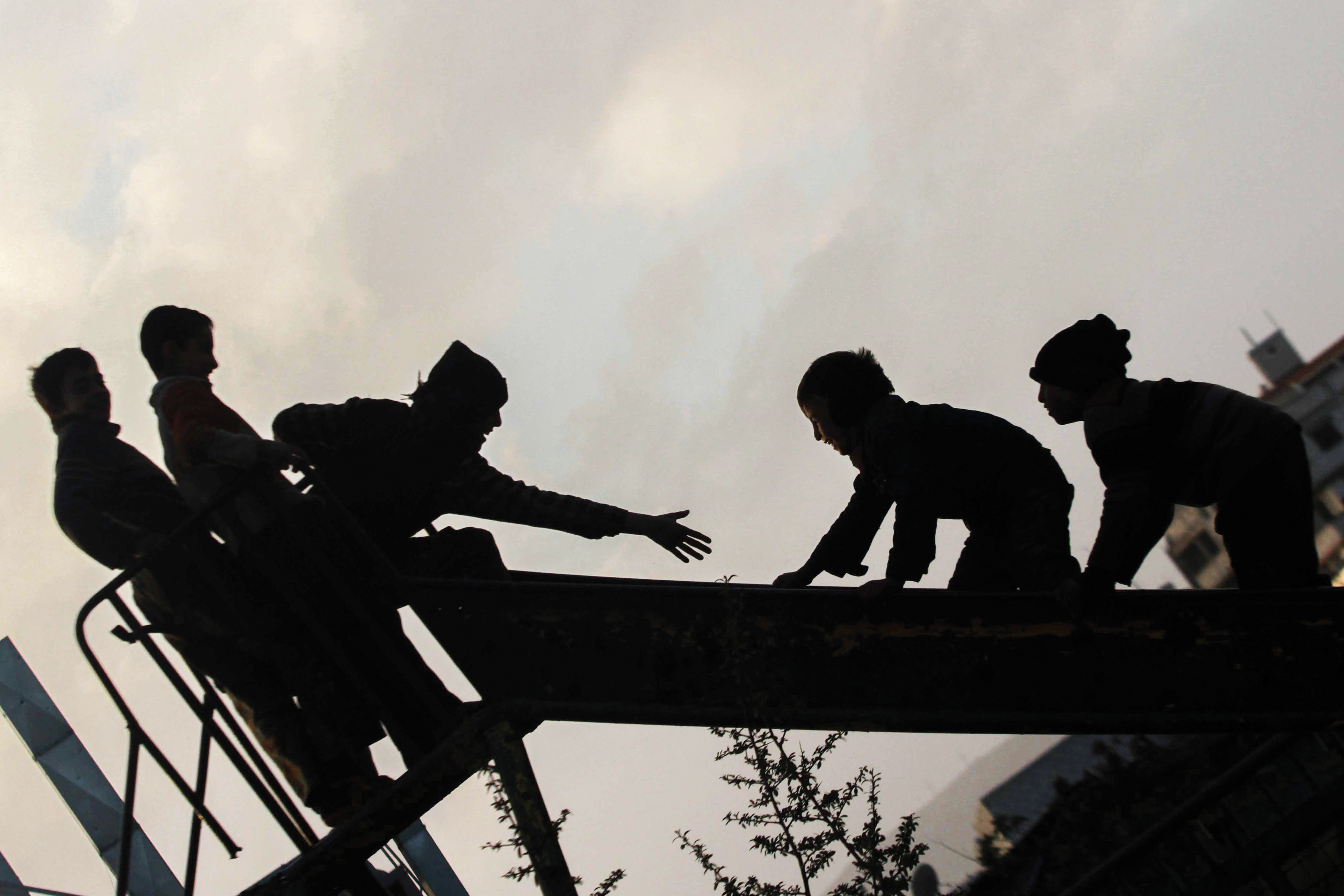
I turn from the Statue of Liberty carved on the bodies of the medics, Gustav Klimt’s Kiss, the melting embrace of a father and son. Edvard Munch’s Scream on the face of a man calling for help and the hand of Picasso telling me the child is on a gurney. A child is reborn as Adam on top of a battered slide.
Am I under siege, unable to escape these paintings, or am I an architect who cannot run from the details of blood and siege? I understand I am one body, in the walls of one being, my eyes racing to consume one another and my head rushes out of another head to break the boredom, my feet race running towards hope like an outstretched arm of one child to another.
The days bleed into each other. Yesterday’s events are close and tomorrow’s are further away. Our days have left their names behind and the straight lines of a calendar turn into a labyrinth. I wanted the arms of that children’s clock on top of that slide to be the last thing I saw, but time betrayed me.
Our days are marked by the names of the massacres and our dates are the tallies of the dead. Even Earth has become flat and extends only to the borders of Ghouta’s plains. They were all under siege, from Jobar to the basil fields, from north Douma to Merj al-Sultan. Around them were soldiers on all sides. Only those living outside the siege could still see that the Earth was round.
My steps take me home and I lay my head on a pillow. A thousand images of hands reach out towards me, calling me. I sleep above them and wait for the sound of the alarm on my phone. Its hands stopped at 7am on a day in 2011. I live in the space between the sound of the alarm and a dream from which I still have not awoken.


